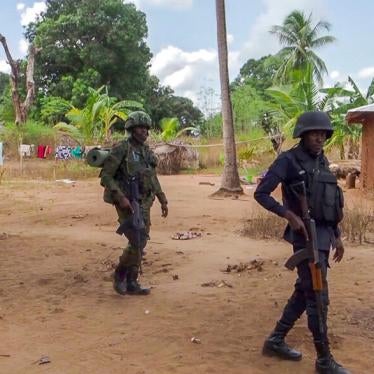This year, attacks by the armed group known locally as Al-Shabab or Al-Sunna wa Jama’a (ASWJ) in the northern Mozambique province of Cabo Delgado have led to a spike in abductions and destroyed homes. The violence displaced people in a region where more than 700,000 have fled their homes since ASWJ’s insurgency began four years ago.
During the first week of March, ASWJ fighters reportedly killed at least 15 civilians in the villages of Mbuidi, Malamba, and Nangõmba, just one kilometer away from Nangade town, the district headquarters.
In February, according to media reports, insurgents attacked at least eight villages across Cabo Delgado, completely burning down five of them. Two men who found dead bodies in their farms told us that residents of Nangade have been living in fear since these incidents, and that they stopped going to their fields. One of the men, Abubakar, arrived in Nangade in December after fleeing his village in Macomia, an area that had an increase ASWJ-related violence last year.
The armed conflict between the ASWJ and the Mozambique government has exacerbated already severe food shortages in Cabo Delgado, according to the United Nations Food and Agriculture Organization. It is one of four Mozambican provinces with the most people experiencing acute food insecurity.
Government forces have also been implicated in serious abuses, including unnecessarily restricting displaced people’s movement and beating and mistreating them.
The Nangade district, situated at the border of Tanzania, also borders the coastal Palma and Mocimboa da Praia districts – both areas of major military operations involving joint Mozambican, Rwandan and Southern African troops. Because of its location, Nangade has become a place of refuge for people fleeing the fighting.
Last year, Mozambican President Filipe Nyusi claimed that troops fighting ASWJ were “gaining ground” and that “the enemy had retreated,” prompting many displaced people to return to their home communities. The UN Department of Safety and Security has called for caution, as “fighting continued in certain places” and “civil authorities had not yet been re-established” in some areas.
The violence in Nangade and other Cabo Delgado districts highlights the need for Mozambican authorities to prioritize civilian protection and safeguard livelihoods across the beleaguered province. The authorities should ensure that people fleeing violence can find safe refuge with adequate access to basic services, far from areas of combat.








